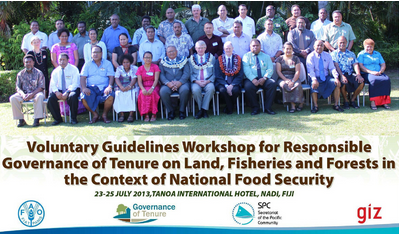Wednesday, 24 July 2013 11:47
In partnership with the Secretariat of the Pacific Community (SPC), the Food and Agriculture Organization of the United Nations (FAO) is conducting a regional workshop to raise awareness on the Voluntary Guidelines on the Responsible Governance of Tenure of Land, Fisheries and Forests in the Context of National Food Security. This workshop aims to develop ideas on how the guidelines can be used to support the improvement of the governance of tenure of land, fisheries and forests in the Pacific Islands.
The Pacific Islands workshop takes place 23–26 July 2013 in Nadi, Fiji.
These guidelines represent an unprecedented international agreement. This was officially endorsed by the Committee on World Food Security in May 2012. Since then, their implementation has been encouraged by the UN General Assembly, Rio +20 declaration, G20, Francophone Parliamentary Assembly and Ministers from 80 countries at the recent 5th Berlin Agriculture Ministers’ Summit.
The purpose of these voluntary guidelines is to serve as a reference and to provide guidance to improve the governance of tenure of land, fisheries and forests with the overarching goal of achieving food security for all and to support the progressive realisation of the right to adequate food.
How people, communities and others gain access to land, fisheries and forests is defined and regulated by societies through systems of tenure. These tenure systems determine who can use which resources, for how long, and under what conditions. The systems may be based on written policies and laws, as well as on unwritten customs and practices.
Sairusi Bulai, Acting Director of the SPC Land Resources Division, says that tenure is always considered a very sensitive issue, making it difficult to discuss the subject in an open and objective manner. But the customary ownership system in the Pacific, which has sustainably supported food security and the livelihoods of the Pacific Islanders, is now under pressure and is changing rapidly, which challenges the way that we must think about tenure and sustainable management of our natural resources. This is due mainly to new land use opportunities afforded by expanding market economies (e.g. hotels, mining, urban development) coupled with the breakdown of traditional agricultural systems due to population growth, rural–urban drift, social and economic changes and climate change.
Gavin Wall, FAO Subregional Representative, stressed that the only position we can tolerate is zero hunger and zero poverty. He said that anything else is inconsistent with the principles we in the Pacific have been raised to cherish and, indeed, counter to the morals and ethics of most cultures and societies.
’Our development challenges can be considered to consist of three overarching issues: there is human deprivation, which includes poverty, hunger, lack of access to education and health care, and so on. There is also the degradation of natural resources required for life in individual countries; and there are problems of global commons which include the Earth’s shared natural resources, such as the deep oceans, the atmosphere, and outer space. The governance of tenure touches on all three of these challenges.
‘Improving governance of tenure is important, and it is important to do it in ways that reflect the interests of citizens, reconcile differences in opinions, and ensure that people are able to exercise their tenure rights and fulfil their duties. In other words, equitable access with no one left out. This is parallel to zero hunger – no one is disenfranchised from development and the environment is enhanced.’
At the end of the workshop, participants should be able to understand the concept of governance of tenure and responsible practices. They should be able to incorporate the guidelines and other available frameworks into their activities, and develop recommendations and plans for their work. The workshop will also provide opportunity to the stakeholders to liaise with partners, establish networks and create synergies.
----------------------------
For more information, please contact:
Aru Mathias, Forest Resources Management Officer, FAO Subregional Office for the Pacific, Samoa, This email address is being protected from spambots. You need JavaScript enabled to view it. , +685 22127
Miriama Brown, Pacific Agricultural and Forestry Policy Network (PAFPNet) Technician, Land Resources Division, SPC,This email address is being protected from spambots. You need JavaScript enabled to view it. , +679 3370 733
SPC Land Resources Division Helpdesk, This email address is being protected from spambots. You need JavaScript enabled to view it. , +679 3370733





CONNECT WITH US